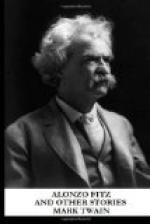“I don’t wish to flatter you, but it is about all I can do to understand you now.”
That was a very pretty compliment, and it put us on the pleasantest terms directly—I use the word in the English sense.
[Later—1882. Esthetes in many of our schools are now beginning to teach the pupils to broaden the ‘a,’ and to say “don’t you,” in the elegant foreign way.]
ROGERS
This Man Rogers happened upon me and introduced himself at the town of -----, in the South of England, where I stayed awhile. His stepfather had married a distant relative of mine who was afterward hanged; and so he seemed to think a blood relationship existed between us. He came in every day and sat down and talked. Of all the bland, serene human curiosities I ever saw, I think he was the chiefest. He desired to look at my new chimney-pot hat. I was very willing, for I thought he would notice the name of the great Oxford Street hatter in it, and respect me accordingly. But he turned it about with a sort of grave compassion, pointed out two or three blemishes, and said that I, being so recently arrived, could not be expected to know where to supply myself. Said he would send me the address of his hatter. Then he said, “Pardon me,” and proceeded to cut a neat circle of red tissue paper; daintily notched the edges of it; took the mucilage and pasted it in my hat so as to cover the manufacturer’s name. He said, “No one will know now where you got it. I will send you a hat-tip of my hatter, and you can paste it over this tissue circle.” It was the calmest, coolest thing—I never admired a man so much in my life. Mind, he did this while his own hat sat offensively near our noses, on the table—an ancient extinguisher of the “slouch” pattern, limp and shapeless with age, discolored by vicissitudes of the weather, and banded by an equator of bear’s grease that had stewed through.
Another time he examined my coat. I had no terrors, for over my tailor’s door was the legend, “By Special Appointment Tailor to H. R. H. the Prince of Wales,” etc. I did not know at the time that the most of the tailor shops had the same sign out, and that whereas it takes nine tailors to make an ordinary man, it takes a hundred and fifty to make a prince. He was full of compassion for my coat. Wrote down the address of his tailor for me. Did not tell me to mention my nom de plume and the tailor would put his best work on my garment, as complimentary people sometimes do, but said his tailor would hardly trouble himself for an unknown person (unknown person, when I thought I was so celebrated in England!—that was the cruelest cut), but cautioned me to mention his name, and it would be all right. Thinking to be facetious, I said:
“But he might sit up all night and injure his health.”
“Well, let him,” said Rogers; “I’ve done enough for him, for him to show some appreciation of it.”




